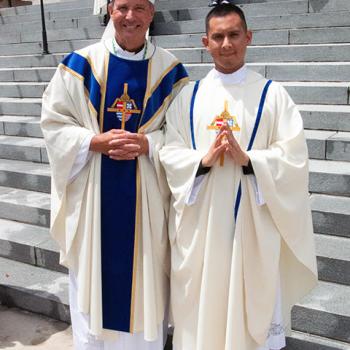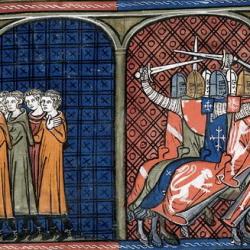The Chief Priests and Elders Tell the Soldiers What to Do
Now the priests and elders tell the guard what to do. "Lie. Tell the opposite story to what really happened. Tell people that his disciples came by night and stole him away while you were asleep. Take this money and be quiet" (28:13).
The next line is that the guard took the money and did as they were directed (28:15a). Then it says, "This story is still told among the Jews to this day" (28:15b). Aren't those two juxtaposed sentences contradictory? How could the story have spread unless somebody in the guard couldn't keep quiet about it? How would we know that they saw something different but were paid off unless somebody leaked the story? It was as impossible for someone to keep the story to himself as it was for Jesus to remain in the tomb. Here, for the first time in this narrative, is an instance of someone not doing what they're told. Somebody kept the hush money but couldn't hush.
I wonder, too, if the priests and elders felt conflicted about what the soldiers had told them. Why would the soldiers lie? Why wouldn't they just admit that they had failed in their mission and that the disciples had stolen the body? That would have been more believable than this elaborate, detailed, ridiculous story about earthquakes, angels, and a Risen Jesus. There are two schools of thought about lying. One says that when you lie you should stay as close to the truth as possible. The other says that you should make the lie so preposterous that nobody could believe you made it up. It has to be true. I wonder how much inner conflict it took for the priests and elders to live the rest of their lives with a lie.
Somebody Didn't Do as They Were Told: Somebody Spilled the Beans
But somebody did lie. Both stories of how the tomb came to be empty can't be true. Either the disciples came and stole the body or God raised Jesus from the dead. We have to pick one. The only people in the story who pick one and stick with it are the women. I can't imagine how painful it would be to know the truth inwardly, whether you were a soldier or a priest, and, for whatever reasons, suppress it for a lifetime.
Since the word got out, somebody, a priest or an elder or a member of the guard spilled the beans. Somebody could no longer keep the knowledge of the Risen Christ shrouded in secrecy and entombed in silence. Somebody did not do as they were told. What bothers me is that the guards were told not to share the Resurrection news and they did anyway.
And we're told to share it and we don't do it often, freely, and joyously enough. The guard doesn't do what the priests tell them to do (remain silent) and we don't do what Jesus tells us to do (speak the good news).
Doing as Jesus Commands Us (Making Disciples) Means Listening to Unlikely Teachers
Jesus appears to the disciples on a mountain. Mountains are important in Matthew, as places where Jesus' authoritative teaching and divine identity are revealed. Mountains in Matthew include the mountain in the temptation where Jesus refuses false authority (4:8), the mount on which Jesus teaches with authority (5:1), the mountain on which the feeding of the four thousand occurs (15:29), and the mountain of the Transfiguration (17:1). (Patte, 398)
Why do the disciples gather on the mountain in Galilee? Because the women have told them what Jesus told them to do. Although women weren't credited with much ability to learn and teach in Jesus' day, the disciples trust them enough to do as they say. They have, temporarily at least, submitted to the women's authority to command them. One contemporary lesson here is that, in making disciples, we need to realize that the best teachers are not always the usual suspects: those with the most education and societal position. Be attentive to other voices.
Doing as Jesus Commands (Making Disciples) Doesn't Require a Perfect Past
Obedient to the women's command, the disciples have gathered. Well, eleven of them at least. The phrase "the eleven disciples" (28:16) instead of the customary "the Twelve," reminds the reader of Judas' betrayal and Peter's denials and that all were scattered, scandalized by Jesus' death (26:30-35). It is to these less than perfect disciples that Jesus gives the responsibility and authority to "make disciples of all nations" (28:19a). (Patte, 397) Apparently, we don't have to have perfect pasts to take Jesus' message into others' futures.
The most powerful faith witness I've heard lately was from a recovering alcohol speaking to other young men about his path to finding God, his morning prayer of "Thank you, God, for a new day of possibilities with you."
Doing as Jesus Commands (Making Disciples) Doesn't Require Having No Doubts
The Greek for "When they saw him, they worshiped him but some doubted" (28:17) could be rendered to indicate that all who worshiped him also had some hesitation mingled in with their worship. Either way, Jesus entrusts authority to make disciples to doubting disciples. There is a contrast between these disciples and the women. The women, when seeing Jesus, worship him (28:9). Their fear does not cancel out their joy, worship, or obedience. They do not doubt. The disciples doubt, that is, they do not initially acknowledge that it is God's power that raised Jesus. The women never questioned this. (Patte 398) Even the guards and the priests and elders showed a little bit of faith, in the form of the fear that God was behind the empty tomb. Why else go to such pains to stage a cover up?





